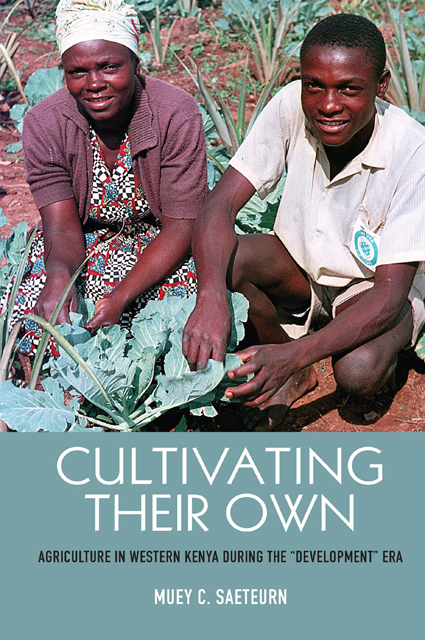Book contents
- Frontmatter
- Dedication
- Contents
- Acknowledgments
- Acronyms and Abbreviations
- Maps
- Introduction
- 1 The Role of Agriculture in Kenya’s Political Economy in the Era of Transition and Independence
- 2 Western Kenya’s Region, People, and the Origins of Population Density
- 3 Chavakali Secondary School: A Place of Learning and Farming
- 4 “Doing Their Part”: 4-K Farmers’ Clubs
- 5 Friends and Acres: The Friends Africa Mission Stewardship Program
- 6 “Home is Home”: The Lugari Settlement Scheme and Maragoliland
- Conclusion: Agricultural Production—The New (Old) Sexy
- Appendix: Interviewee Information
- Notes
- Bibliography
- Index
Conclusion: Agricultural Production—The New (Old) Sexy
Published online by Cambridge University Press: 18 January 2023
- Frontmatter
- Dedication
- Contents
- Acknowledgments
- Acronyms and Abbreviations
- Maps
- Introduction
- 1 The Role of Agriculture in Kenya’s Political Economy in the Era of Transition and Independence
- 2 Western Kenya’s Region, People, and the Origins of Population Density
- 3 Chavakali Secondary School: A Place of Learning and Farming
- 4 “Doing Their Part”: 4-K Farmers’ Clubs
- 5 Friends and Acres: The Friends Africa Mission Stewardship Program
- 6 “Home is Home”: The Lugari Settlement Scheme and Maragoliland
- Conclusion: Agricultural Production—The New (Old) Sexy
- Appendix: Interviewee Information
- Notes
- Bibliography
- Index
Summary
“Agriculture can create a million jobs for youth,” was the title of Machel Waikenda’s January 5, 2014 article in the Standard Digital, an online Kenyan media outlet. Writing over fifty-years after the independent Kenyan government initiated its development project of pragmatic agrarianism, Waikenda, a politician and youth activist, encouraged readers to embrace the Jubilee government’s vision for the large number of unemployed young people living throughout Kenya’s cities and townships. The Jubilee government, which assumed power in Spring 2013, had published its national economic program aimed at tackling the country’s forty percent unemployment rate. Seventy percent of those unemployed were between the ages of fifteen and thirty-five. This statistic was of major concern for someone like Waikenda who also served as one of President Uhuru Kenyatta’s trusted advisors on youth affairs. Waikenda’s piece in the Standard Digital lent support to his government’s plan to reduce the nation’s high level of unemployment by increasing Kenya’s largest economic sector—agriculture.
At the time of Waikenda’s article, Kenya’s National Bureau of Statistics (KNBS) reported that agriculture was the fastest growing sector making up about twenty-five percent of the growth in Gross Domestic Product. This statistic convinced the Jubilee government that expanding agricultural output was a logical solution to employ in its effort to reduce the worsening unemployment rate among the growing urban youth population. Like its predecessors, the current Kenyatta administration blamed this very group of individuals for escalating incidents of crime and insecurity in the country, and thus was a demographic the government sought to regulate. Waikenda, as a result, used the online news outlet to urge idle urban young Kenyans to consider the potential and “great opportunities” that working on the land and living in the countryside may offer them. “Over the years, we have seen millions of young people move to the cities searching for those elusive (white-collar) jobs,” he writes; “it is time we encourage a reverse exodus (urban-to-rural migration) in an agricultural-based economy … yes, agricultural production can become the new sexy.”
Indeed, Waikenda’s call for young people to explore agribusiness, a euphemism for tough manual labor, as a possible career path and his comments about the benefits of rural life are strikingly similar to the pleas made by elite politicians and their development partners during Kenya’s decolonization period and early independence years.
- Type
- Chapter
- Information
- Cultivating their OwnAgriculture in Western Kenya during the 'Development' Era, pp. 152 - 160Publisher: Boydell & BrewerPrint publication year: 2020



